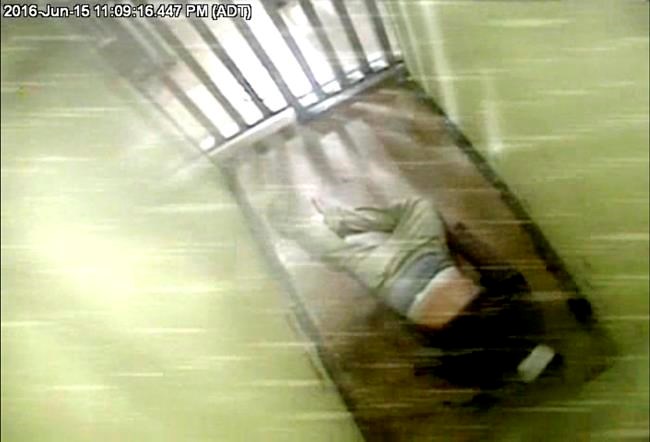HALIFAX — A Halifax police constable who helped arrest a man who died of suffocation in a lockup cell in 2016 told a hearing Wednesday he left a spit hood on the detainee's head because he feared the man would remove it and spit on him.
Const. Justin Murphy testified before the Nova Scotia Police Review Board, which is hearing an appeal of the discipline he and constables Ryan Morris and Donna Lee Paris received for their roles in arresting Corey Rogers and leaving him in a cell wearing the hood.
The province's medical examiner has said the 41-year-old man died of suffocation on June 15, 2016, while lying face down in a police station cell with the hood covering his mouth as he appeared to be vomiting. A spit hood is a face covering designed to prevent a person under arrest from spitting on or biting others.
Murphy testified it's been his experience that after a frustrated or angry detainee's handcuffs are removed, they sometimes tear off their spit hood and spit at officers through the lockup cell bars.
The constable told the panel he has "been spit on and … unfortunately it's quite common," while answering questions posed by Ted Murphy, the lawyer for Halifax Regional Municipality.
The officer said the only occasion during which he has seen officers remove a spit hood was when prisoners were sitting in a special restraint chair and had calmed down. He said he has learned the masks are necessary for self-protection, adding that during one incident, a man he detained in Halifax spewed blood-laced mucus and saliva on him.
"After that, I started to carry the spit hood with me. I didn't want that to happen again," the officer testified during the third day of the hearing at a Halifax hotel.
Murphy, however, said he had never read instructions written on the spit hood package, which state, "Improper use may result in serious injury or death, asphyxiation, suffocation or drowning in one's own fluid." The instructions also note that wearers "should be under constant supervision and never left unattended, and it should not used on anyone who is vomiting."
The constable told the hearing he nonetheless felt it was a proper use of the hood in Rogers's case, adding that the spit hood was relatively loose. "I saw it as a safety device so they couldn't project … fluids into my face or body," he told Jason Cooke, the lawyer for Rogers's mother.
Rogers was arrested in 2016 outside a Halifax children's hospital in a state of extreme intoxication after he rapidly downed a half-pint of whiskey, following the birth of his child.
Murphy said he saw Rogers banging his head against the Plexiglas divider inside Morris's police cruiser and upon arrival at the police station, he saw mucus on the divider, which he said led him to go inside and pick up a spit hood for Rogers. Paris was in a police vehicle with Murphy as the incident unfolded.
The mask was placed on Rogers before the man was lifted out of the vehicle and carried into the station by officers.
Video presented at the hearing shows Rogers inside the police station booking area lying on the floor and shouting "No!" when the arresting officers ask him to walk to the cells.
Though Murphy said he had heard that Rogers had rapidly consumed whiskey outside the hospital, he said he had also known that the detainee was an alcoholic with a high tolerance for alcohol, and he said he had believed that Rogers was capable of walking and was refusing to do so.
The constable said many of the detainee's words were slurred and inaudible, but he nonetheless testified that he felt Rogers was being passively resistant.
He told the hearing he wasn't alarmed after he had removed Rogers's handcuffs, had exited the cell and had seen the man lying face down with the spit hood on. Murphy testified he had been confident the cells' special constables, referred to as booking officers, would check on the prisoner's well-being every 15 minutes.
The constable said he had many years of experience arresting highly intoxicated people, and he had not hesitated to call paramedics if the detainees weren't alert or unable to stand. He repeated several times in testimony, however, that he didn't believe that was the case for Rogers, adding that the prisoner had been "choosing" not to stand.
Murphy said it's possible for intoxication to quickly take a turn for the worse, but he said "at that point, my thinking was (Rogers) was still being passive resistant. He wasn't happy to be there."
During Monday's hearing, a Halifax police audit officer had testified no clear policy existed five years ago regarding when officers should or shouldn't apply spit hoods.
The case has been in the headlines for years in Halifax, with Jeannette Rogers, the man's mother, saying police had mishandled her son and they need to drastically improve their treatment of highly intoxicated prisoners.
Part of the mandate of the hearing is to examine whether the officers breached provincial Police Act regulations, including “neglecting or lacking concern for the health or safety of a person in the member’s custody.”
In January, the Nova Scotia Court of Appeal ordered a new trial for two special constables at the Halifax lockup, Daniel Fraser and Cheryl Gardner, who were convicted in November 2019 of criminal negligence in Rogers's suffocation death.
The original trial had focused on whether Fraser and Gardner had properly followed policies on the frequency of checking the prisoner.
This report by The Canadian Press was first published June 23, 2021.
Michael Tutton, The Canadian Press



